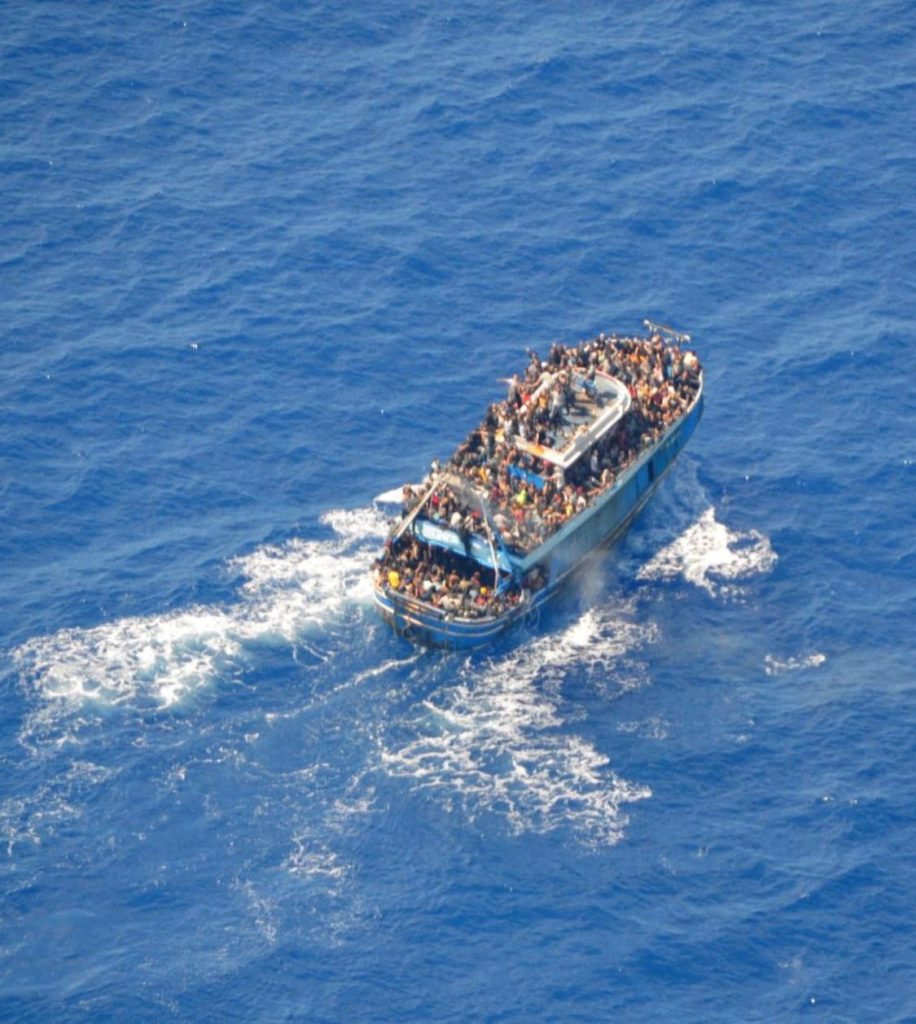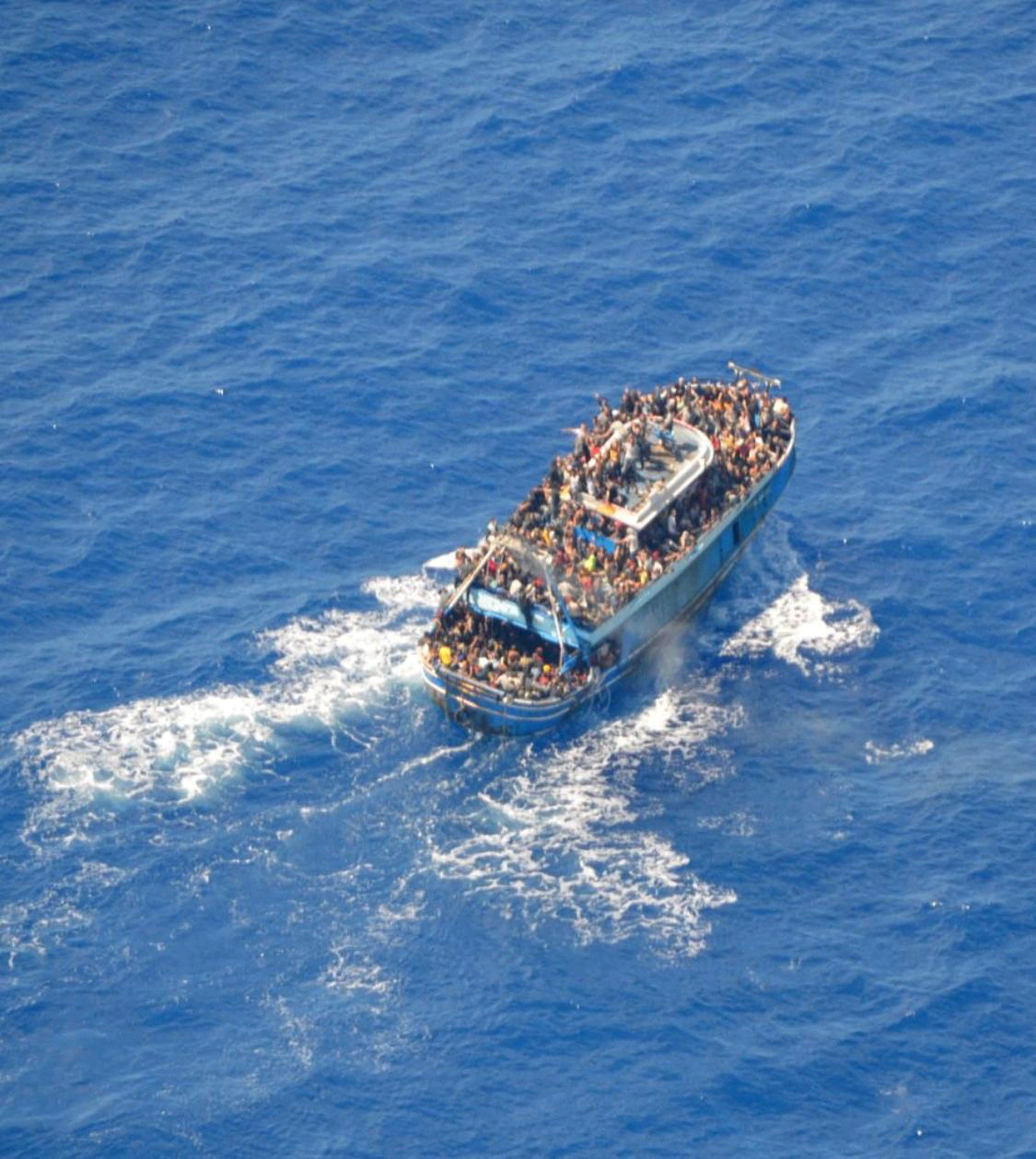UPD –
A court in the port city of Kalamata in the Peloponnese has dropped the charges against nine Egyptian nationals accused of human trafficking in a 2023 migrant boat shipwreck in the Mediterranean resulting in the death of hundreds of migrants and refugees, citing it had no jurisdiction as the ship had sunk in international waters.
The defendants, aged between 21 and 37 years old, were among the survivors and faced multiple charges including negligent homicide, participation in a criminal organization, and facilitating illegal entry into the country.
Today, Tuesday May 21, the controversial trial of 9 Egyptian nationals on human smuggling charges connected to the Adriana shipwreck off the coast of Pylos of last June, begins in Kalamata.
Watchdogs and international organizations estimate that the shipwreck claimed the lives of hundreds of irregular migrants. The incident has been shrouded in controversy and accusations of a cover-up have beem made since the accident, particularly in regards to: the role of the Greek coastguard in the accident, what has been perceived as a slow pursuit of justice, and now the quality of evidence against the Egyptians standing trial.
The trial is held at the court of first instance of Kalamata, and the Egyptians, aged between 20 and 40, are facing criminal charges at the Three-member Court of Criminal Appeals.
The accused, which have come to be known as the ‘Pylos 9,’ were among the 104 rescued from the shipwreck and were arrested following the pre-investigation procedure of the port authorities.
They have pleaded not-guilty and have been in custody for almost a year.
According to media reports, the prosecutors claim the defendants packed the migrants into the ship, that did not have any life jackets and was clearly unfit for such a journey from Tobruk, Libya, to Italy, and took turns steering.
The defendants have denied the charges against them, claiming that they themselves paid to be smuggled on the Adriana.
The court of Kalamata has undertaken the trial of the Egyptians because it has jurisdiction, as the shipwreck occurred off the harbor town of Pylos in the southwest Peloponnese.
The harsh stance being taken against the alleged smugglers is aligned with Greek and European policy to aggressively prosecute and dismantle smuggling networks, but watchdogs question whether the evidence against the accused holds water.
About the Pylos Shipwreck
The shipwreck of the Adriana has been painted as one of the Mediterranean’s deadliest wrecks involving irregular migrants.
Some international media reports and special investigations into the wreck claim that more than 600 people died when the vessel overturned and sank, which means that a total of approximately 750 people would have been crammed into the vessel.
Conversely, Greek authorities place the death toll at 82, which is based upon the actual number of bodies retrieved from the water.
Reports by third parties and human rights organizations, such as Amnesty International and Human Rights Watch, highlight the conflicting account of events by Greek authorities and various institutions involved, as well as by the survivors themselves.
The controversy surrounding the role of the Hellenic Coast Guard in the accident stems from the fact that it detected the distressed and dilapidated vessel and followed it for seven hours without offering assistance.
According to 40 survivors who have filed a criminal complaint at Greece’s naval court, the Hellenic Coast Guard eventually tried towing the boat, which led to its capsizing.
The Hellenic Coast Guard has denied the accusations, claiming last summer that the vessel was safe and traveling towards Italy, and therefore didn’t need to be rescued. It also denies throwing a rope to tow the Adriana.
Substantiating the contradictory accounts of the Hellenic Coast Guard and survivors has been complicated by the fact that the cameras on the Hellenic Coast Guard’s rescue boat were not on, and no other videos of the event have surfaced.
The Investigations
A report by To Vima English Edition at the start of 2024 revealed that separate investigations into the matter are underway in the country, including: the trial of the Egyptians at the criminal court of Kalamata, an investigation by the naval court of the Hellenic Coast Guard in Piraeus, and another by the Greek Ombudsman.
In what has widely been considered an extraordinary move, the Greek Ombudsman’s office announced on November 9 that it had activated a special mechanism called the National Mechanism for the Investigation of Arbitrary (which is provided for under Greek law Gov Gazette B’ 2359/2020, art 8 par. a.) to conduct its own separate investigation into the role of the Hellenic Coast Guard in the capsizing of the Adriana.
The Ombudsman’s office justified the decision in a statement, saying that, despite existing inquiries, it was necessary to activate the mechanism due to “the gravity (number of drowned and possibly missing), the vulnerability of victims and the persistence of allegations for arbitrary behavior by the coastguard- and the fact that the Hellenic Coast Guard declined to open up an internal investigation.” The statement added that “…had the Ombudsman not decided on an own investigation, there would not have been any – disciplinary – investigation of the incident.”
In response to the announcement, a source within Greece’s coastguard came to the defense of the corps, telling To Vima English Edition that it has already initiated a case at the highest level possible and therefore cannot open another, and that the existing case does not rule out the prospect of criminal charges eventually being filed.
The source also said the coastguard was cooperative with the Ombudsman’s office and responded to all of its requests for additional information.
Both the Ombudsman and sources within the Coast Guard told To Vima English Edition that it is unclear how long their separate investigations will last.




